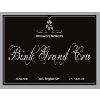Brouwerij Kerkom - Bink Grand Cru
-
ABV:
13.00% -
Serving Temperature:
43-50° F -
Suggested Glassware:
Snifter
Note: If you’re wondering what the word “Bink” means, you’re not alone—we had the same thought. Essentially it’s a colloquial term of endearment for the inhabitants of Sint-Truiden (akin to the word “dude”, but specific to the people of this area). Many of the beers from the Kerkom Brewery have the term in the name. These Bink beers have clearly been designed to embody local spirit, and these Binks have become a member of the local citizenry themselves.
In the countryside of East Flanders, Belgium, on a small family farm amidst Belgium’s best pear and cherry orchards, stirs the unrest of a man who has committed himself to a brave and noble mission to enact change in his country. Perturbed by the decreasing interest in traditional, hoppy Belgium beers, Marc Limet decided to take action and do something about it. Like a number of other small farmhouse brewers in Belgium, Marc felt compelled to move from amateur brewing to a more commercial operation to counter the disturbing trend of dumbing down in Belgian brewing. Unlike larger Belgian breweries, Marc can commit the time required to create true-brew works of art without the use of corn sugar, artificial fruit flavors, or other cheap ingredients. In so doing, he keeps alive the great brewing spirit and traditions of this beer-loving nation.
Marc Limet’s brewery, known as Brouwerij Kerkom, is essentially an extension of the home he has made with his wife Marina. Their on-site pub feels like a welcoming nook of their house; a place where folks from all over the country will gather throughout the year to enjoy these acclaimed farmhouse beers. The Kerkom tradition is not new, however. Brewing has been going on under this name since 1878, when the original Kerkom Brewery was founded after Evarist Clerinx left his studies of medicine to become a brewer (let’s call it a shift from one medicine to another). He purchased an old café known as “La Renaissance” and rebuilt it as a brewery. In 1932, 12 years after the brewery reopened (German occupiers claimed the brewery during the First World War), Evarist’s son Paul took up the craft.
Having later survived the Second World War, brewing continued as a family affair when Jean Clerinx joined the brewery, but times were tough. During WWI there were 127 breweries in the region. By 1965, there were only 13 left. Tastes had changed, and local breweries had closed in droves. Today, only 6 of the original 127 pre-WWI-era breweries are still active—the Kerkom Brewery is one of them.
In 1968, Jean Clerinx also decided to cease brewing operations at Kerkom. After his retirement in 1988, he started up a small brewery that created beers using old-world, traditional methods. In 1999, Marc Limet, masterbrewer and hop-hero took up as Kerkom’s owner and brewer. He has since put 100% of his efforts into bringing the character and flare back to Belgium’s locally-brewed beers by creating new beers with old-world composition.
For more information about the brewery, check out their website at www.brouwerijkerkom.be. You’ll also find information there about bicycling routes through this beautiful region—where you can ride roads that cut between orchards and fruit plantations in the famed region of Haspengouw. Just follow the “appelroute” to get to the brewery. What a great way to recharge after a bike ride through the Flemish countryside! Pick a lighter beer than what we’re featuring this month—this one’s no biking brew.

Unmatched Variety by style, brewery & country
Choose from Five different Beer Clubs offering unmatched variety by brewery,
country of origin, and beer style to suit your specific tastes.


